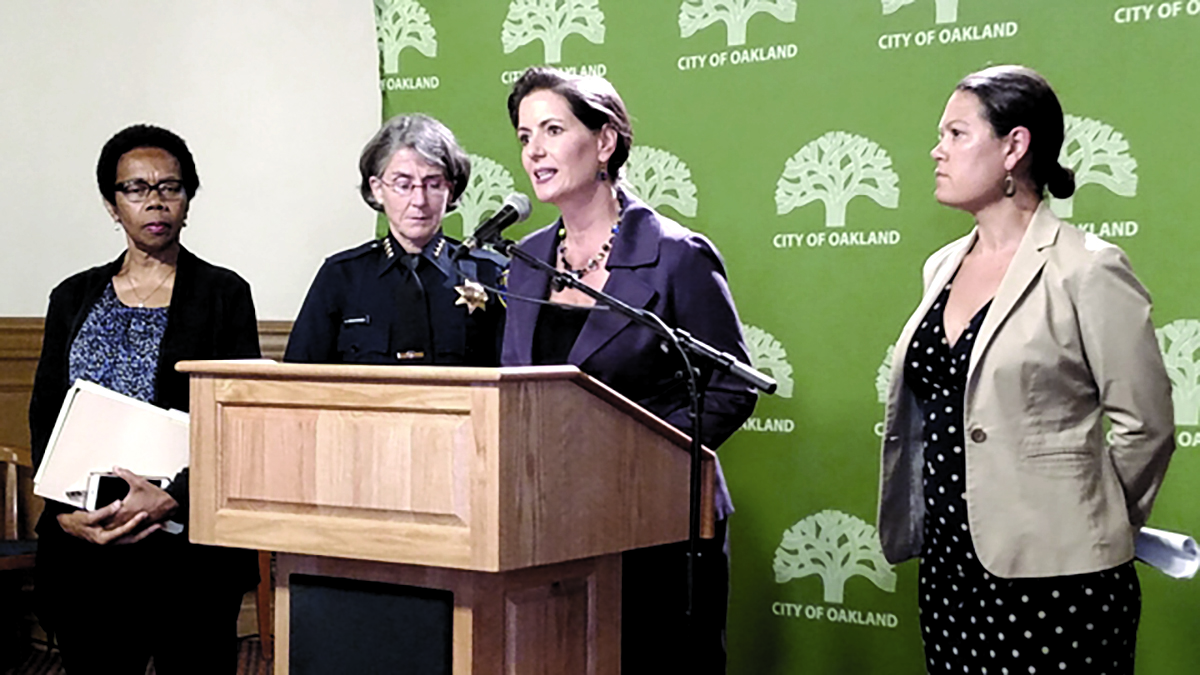City Government
Are Schaaf Administration and City Attorney Undermining Independent Police Commission?

Back in July when the Oakland City Council passed the enabling ordinance for the Oakland Police Commission—over the strenuous objections of the City Administrator and the City Attorney—it appeared for a moment that the issue was finally settled: commission staff would be independent of the mayor and the mayor’s administration.
In other words, the City Council decided the commission’s staff would report to the commission, not the City Attorney or the City Administrator.
Based on the Measure LL charter amendment, the City Council passed the ordinance July 10 on a 6-1 vote (with only Annie Campbell Washington voting no). The City contests the council decision, saying its provisions conflict with the City Charter.
Councilmembers rejected the City Attorney’s and the City Administrator’s contention that the City Charter as whole requires commission staff to be controlled by them, not independent of the administration as intended by the charter amendment, which passed two years ago with 83 percent of the vote.
Now, however, the mayor’s administration and the City Attorney are prepared to ignore the City Council’s decision, based on their interpretation of the City Charter, according to members of the steering committee of the Coalition for Police Accountability who met last Thursday with Mayor Libby Schaaf.
“The mayor is siding with the position of the City Attorney and the City Administration, even though the enabling ordinance was passed,” said Rashidah Grinage of the Coalition for Police Accountability.
“Regardless of her opinion, they have to implement what was passed. Period. They are saying they don’t have to abide by it. But their only recourse is to go to court to get an injunction. Otherwise, they have to implement it,” she said.
Henry Gage, a coalition member who attended the meeting with Mayor Schaaf, said “The Mayor seems unwilling to go against the City Administrator and the City Attorney.”
“You’d think once the City Council votes it would be over,” said Gage. “However, what I’ve learned is that if the executive branch doesn’t want to do something, the only real remedy is go to the courts.”
Chair of the Police Commision Thomas Smith, speaking at a City Council meeting, emphasized the need for the commission’s staff to be independent . “Having someone who is not a member of the City Attorney’s Office is very important,” he said.
Pamela Drake of the coalition said that what the public is seeing is the latest maneuver in a series of actions the mayor and the administration have taken to weaken the police commission. “They are doing everything they can to undermine an independent police commission,” she said.
Seeking an explanation of the administration’s decision, the Oakland Post contacted the City Attorney, the City Administrator and Mayor Schaaf. By Post deadline, none of them had responded. According to Grinage, the issue of independence concretely comes down to the employment contracts and jobs descriptions of three employees and consultants.
One issue has to do with contracts for the two attorneys who work for the police commission and the Civilian Police Review Agency (CRPA).
“These contracts predate the enabling ordinance, and they have to be rewritten in order to be in conformity with the ordinance. (At present), their supervisor is the City Attorney’s Office, and that is unacceptable,” said Grinage.
The other issue has to be with the position of the inspector general, who has yet to be hired and would work for the police commission.
“They are on the verge of putting out the job announcement for the inspector general,” said Grinage. The question is whether that person will report to the commission or the City Administrator, she said.
“I expect sooner or later that we will wind up in court over this,” said Grinage.
By ignoring the City Council decision, the mayor and the City Attorney are bypassing the requirements of the City Charter, according to Councilmember Desley Brooks.
“The City Charter is clear: The City Council sets the policy of the city, and it is the responsibility of the mayor to implement it,” she said.
Attorney Dan Siegel, who served as Mayor Jean Quan’s legal advisor, said that he has carefully studied Oakland’s City Charter.
“The main takeaway is that the City Attorney does not have an independent role in city government. The City Attorney is lawyer for the mayor, council and departments and has to follow the direction of her employers.”
When various agencies of government disagree, he said, the dispute must often be settled in court.
Mayoral candidate Cat Brooks said, “Oaklanders voted for what they believed would be a community-controlled police commission. The City and the Mayor need to respect the voices of the people.”
“The mayor has tried to prevent the commission from having full autonomy from the beginning,” with her demand to have the authority to appoint three members of the commission, said Brooks.
Attorney Pamela Price, also a mayoral candidate, supports the need for the commission to be an independent body.
“The voters have shown their lack of confidence in the city administration’s willingness to hold the police department accountable,” said Price. “Their intent was clearly to create an independent structure, and that structure should be fully empowered to carry out its function.”
Author’s Note: Mayor Schaaf, City Administrator Landreth and City Attorney Parker failed to respond to Oakland Post’s Questions
Activism
Oakland Post: Week of December 31, 2025 – January 6, 2026
The printed Weekly Edition of the Oakland Post: Week of – December 31, 2025 – January 6, 2026

To enlarge your view of this issue, use the slider, magnifying glass icon or full page icon in the lower right corner of the browser window.
Activism
Oakland Post: Week of December 24 – 30, 2025
The printed Weekly Edition of the Oakland Post: Week of – December 24 – 30, 2025

To enlarge your view of this issue, use the slider, magnifying glass icon or full page icon in the lower right corner of the browser window.
Alameda County
Oakland Council Expands Citywide Security Cameras Despite Major Opposition
In a 7-1 vote in favor of the contract, with only District 3 Councilmember Carroll Fife voting no, the Council agreed to maintain its existing network of 291 cameras and add 40 new “pan-tilt-zoom cameras.”

By Post Staff
The Oakland City Council this week approved a $2.25 million contract with Flock Safety for a mass surveillance network of hundreds of security cameras to track vehicles in the city.
In a 7-1 vote in favor of the contract, with only District 3 Councilmember Carroll Fife voting no, the Council agreed to maintain its existing network of 291 cameras and add 40 new “pan-tilt-zoom cameras.”
In recent weeks hundreds of local residents have spoken against the camera system, raising concerns that data will be shared with immigration authorities and other federal agencies at a time when mass surveillance is growing across the country with little regard for individual rights.
The Flock network, supported by the Oakland Police Department, has the backing of residents and councilmembers who see it as an important tool to protect public safety.
“This system makes the Department more efficient as it allows for information related to disruptive/violent criminal activities to be captured … and allows for precise and focused enforcement,” OPD wrote in its proposal to City Council.
According to OPD, police made 232 arrests using data from Flock cameras between July 2024 and November of this year.
Based on the data, police say they recovered 68 guns, and utilizing the countywide system, they have found 1,100 stolen vehicles.
However, Flock’s cameras cast a wide net. The company’s cameras in Oakland last month captured license plate numbers and other information from about 1.4 million vehicles.
Speaking at Tuesday’s Council meeting, Fife was critical of her colleagues for signing a contract with a company that has been in the national spotlight for sharing data with federal agencies.
Flock’s cameras – which are automated license plate readers – have been used in tracking people who have had abortions, monitoring protesters, and aiding in deportation roundups.
“I don’t know how we get up and have several press conferences talking about how we are supportive of a sanctuary city status but then use a vendor that has been shown to have a direct relationship with (the U.S.) Border Control,” she said. “It doesn’t make sense to me.”
Several councilmembers who voted in favor of the contract said they supported the deal as long as some safeguards were written into the Council’s resolution.
“We’re not aiming for perfection,” said District 1 Councilmember Zac Unger. “This is not Orwellian facial recognition technology — that’s prohibited in Oakland. The road forward here is to add as many amendments as we can.”
Amendments passed by the Council prohibit OPD from sharing camera data with any other agencies for the purpose of “criminalizing reproductive or gender affirming healthcare” or for federal immigration enforcement. California state law also prohibits the sharing of license plate reader data with the federal government, and because Oakland’s sanctuary city status, OPD is not allowed to cooperate with immigration authorities.
A former member of Oakland’s Privacy Advisory Commission has sued OPD, alleging that it has violated its own rules around data sharing.
So far, OPD has shared Flock data with 50 other law enforcement agencies.
-

 Activism4 weeks ago
Activism4 weeks agoDesmond Gumbs — Visionary Founder, Mentor, and Builder of Opportunity
-

 Activism4 weeks ago
Activism4 weeks agoFamilies Across the U.S. Are Facing an ‘Affordability Crisis,’ Says United Way Bay Area
-

 Alameda County4 weeks ago
Alameda County4 weeks agoOakland Council Expands Citywide Security Cameras Despite Major Opposition
-

 Alameda County4 weeks ago
Alameda County4 weeks agoBling It On: Holiday Lights Brighten Dark Nights All Around the Bay
-

 Activism4 weeks ago
Activism4 weeks agoBlack Arts Movement Business District Named New Cultural District in California
-

 Activism4 weeks ago
Activism4 weeks agoLu Lu’s House is Not Just Toying Around with the Community
-

 Activism4 weeks ago
Activism4 weeks agoOakland Post: Week of December 17 – 23, 2025
-

 Black History3 weeks ago
Black History3 weeks agoAlfred Cralle: Inventor of the Ice Cream Scoop





















































